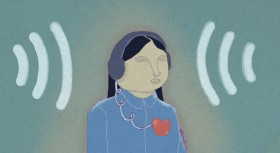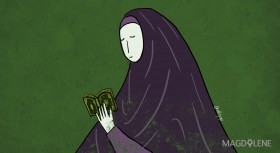Legendary feminist, founder of the game-changing Ms. magazine and still one of the most prominent and influential people for the cause, Gloria Steinem is an international icon for gender equality and inclusiveness. When she announced that she would release a book, “My Life on the Road,” her first in 10 years, readers including me, rejoiced.
At first I was excited that Steinem included stories about traveling and working with feminists and organizers of color (including Florynce Kennedy and Wilma Mankiller), and mentioned that they taught her and influenced her work. As a first-level feminist (I know, I know, that knowledge is not a real barrier to being a feminist, but it can be mind-boggling) and a woman of color, I find myself constantly overwhelmed by the depth of issues and number of different communities under the umbrella of “feminism.”
One of the most contentious areas in the movement involves race and how women of color and their unique issues, including racism and violence, are excluded. It’s a complex issue and I’m never sure where to begin, but at the beginning of My Life on the Road, I was hopeful that Steinem would shed some light and give me a good place to start. That is probably why I’m not as enthused about this book as I probably should be. Yes, it is about Steinem’s travels across the US, but much of her travel was for work, either as a journalist or as an organizer, and I hoped she would add history or meaningful commentary about the evolution of the feminist movement.
After numerous mentions of women of color, My Life On The Road just seems like it was trying a little too hard and devolves into some tokenism. Of Native American organizer and former leader of the Cherokee people Mankiller, Steinem writes that she was impressed greatly by Mankiller’s wisdom and that she “felt as if she were being sheltered by a strong and timeless tree,” which reeks of imagery from Disney’s animated film Pocahontas.
Earlier in the book, Steinem writes lyrically about Mrs. Greene, a black woman who Steinem meets at a Martin Luther King Jr. rally. As Steinem goes on to tell the tale of their brief interaction, she quickly puts Mrs. Greene on a “wise black woman” pedestal.
But only Mrs. Greene made me understand between race and caste …
These interactions and her descriptions of minority women who attended the first-ever National Women’s Conference is filled with over-the-top, fawning descriptions of these noble minorities. What the book did not include was what happened after the conference and if any of the declarations made there had any impact on the lives of American women.
Despite my criticism, there was much that I did enjoy about My Life On The Road, particularly tales about her father, Leo Steinem, a traveling antique salesman who instilled a love of travel in her, but also put the family in hard financial situations with his flights of fancy. The most interesting parts of the book were when Steinem got personal. It was inspiring to know that even Steinem, such a poised and confident person, had times of self-doubt (like when writer Gay Talese said she was “a pretty girl who came to New York and pretended to be a writer” and she held her tongue) and was actually scared of public speaking until she was in her 30s.
Also impressive was the fact that Steinem found herself at so many important historic American events including King’s momentous “I Have a Dream” speech, the first National Women’s Conference in 1977, and in Florida during the recount of votes during the 2000 US presidential election. It was a fascinating personal point of view on some of the biggest events in modern US history.
Ultimately, My Life On The Road is a charming piece of travel writing from a lyrical storyteller, but it lacks depth on social issues, let alone feminism. The book should be enjoyed as a fine piece of travel writing and personal essay, but also serve as a reminder that even the most prominent feminist in our lifetime doesn’t “get it”, and we still have a long way to go before we truly have equality for all.
Christi Hang is an editor and writer based in Jakarta. When she's not working, she's trying to read more, eat more, explore more and hang out with her friends more.
* Photo Courtesy of Marnie Joyce








Comments